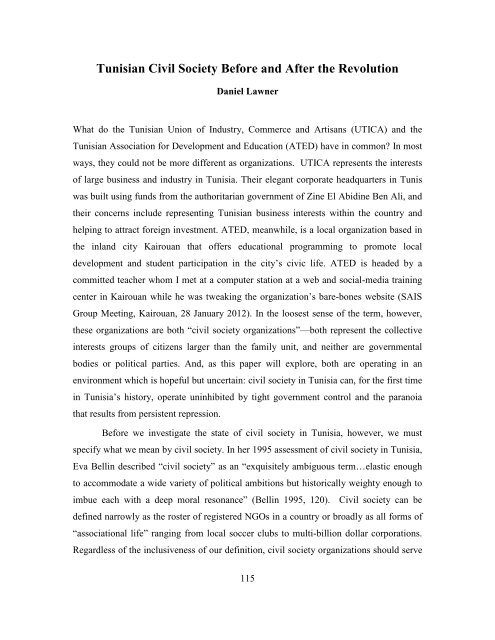Tunisia: Understanding Conflict 2012 - Johns Hopkins School of ...
Tunisia: Understanding Conflict 2012 - Johns Hopkins School of ...
Tunisia: Understanding Conflict 2012 - Johns Hopkins School of ...
Create successful ePaper yourself
Turn your PDF publications into a flip-book with our unique Google optimized e-Paper software.
<strong>Tunisia</strong>n Civil Society Before and After the Revolution<br />
Daniel Lawner<br />
What do the <strong>Tunisia</strong>n Union <strong>of</strong> Industry, Commerce and Artisans (UTICA) and the<br />
<strong>Tunisia</strong>n Association for Development and Education (ATED) have in common? In most<br />
ways, they could not be more different as organizations. UTICA represents the interests<br />
<strong>of</strong> large business and industry in <strong>Tunisia</strong>. Their elegant corporate headquarters in Tunis<br />
was built using funds from the authoritarian government <strong>of</strong> Zine El Abidine Ben Ali, and<br />
their concerns include representing <strong>Tunisia</strong>n business interests within the country and<br />
helping to attract foreign investment. ATED, meanwhile, is a local organization based in<br />
the inland city Kairouan that <strong>of</strong>fers educational programming to promote local<br />
development and student participation in the city’s civic life. ATED is headed by a<br />
committed teacher whom I met at a computer station at a web and social-media training<br />
center in Kairouan while he was tweaking the organization’s bare-bones website (SAIS<br />
Group Meeting, Kairouan, 28 January <strong>2012</strong>). In the loosest sense <strong>of</strong> the term, however,<br />
these organizations are both “civil society organizations”—both represent the collective<br />
interests groups <strong>of</strong> citizens larger than the family unit, and neither are governmental<br />
bodies or political parties. And, as this paper will explore, both are operating in an<br />
environment which is hopeful but uncertain: civil society in <strong>Tunisia</strong> can, for the first time<br />
in <strong>Tunisia</strong>’s history, operate uninhibited by tight government control and the paranoia<br />
that results from persistent repression.<br />
Before we investigate the state <strong>of</strong> civil society in <strong>Tunisia</strong>, however, we must<br />
specify what we mean by civil society. In her 1995 assessment <strong>of</strong> civil society in <strong>Tunisia</strong>,<br />
Eva Bellin described “civil society” as an “exquisitely ambiguous term…elastic enough<br />
to accommodate a wide variety <strong>of</strong> political ambitions but historically weighty enough to<br />
imbue each with a deep moral resonance” (Bellin 1995, 120). Civil society can be<br />
defined narrowly as the roster <strong>of</strong> registered NGOs in a country or broadly as all forms <strong>of</strong><br />
“associational life” ranging from local soccer clubs to multi-billion dollar corporations.<br />
Regardless <strong>of</strong> the inclusiveness <strong>of</strong> our definition, civil society organizations should serve<br />
115
















